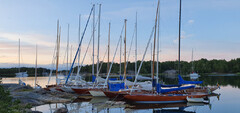BEKKING: 'HARDEST LEG OF MY LIFE'
“That is the hardest leg I have ever sailed in my life.” Bouwe Bekking is not prone to overstatements and this comment was no exception.
As he hobbled off the boat onto a cold, foggy Qingdao dock, nowhere in a memory spanning five shots at this race could he recall conditions like those of the last 12 days.
Be it the shoals and reefs that shredded nerves early in the leg, or the storms that brought the fleet to its knees, Bekking was more relieved to have finished than to have won a second straight leg.
“I won’t forget that in a hurry,” he said. “But I’d like to. We won the leg and that is great: we are right back in this yacht race. But getting home in one piece was more important.”
To that end, their shore manager has cause to be grateful. Campbell Field already has a hole to mend in the hull of the retired Telefonica Black, while his counterparts at Delta Lloyd and Ericsson 3 have similar damage to repair in a pair of yachts that suspended racing in the carnage. Green Dragon and PUMA have both had their crises, but with the exception of Ericsson 4, Blue is the only boat that does not appear to have been hit by a torpedo.
“We will know for sure when we lift her out,” said boat captain Pepe Ribes. “But she seems to be okay.”
Needless to say, the boat did not emerge unscathed – next to impossible against winds of 55 knots and steep waves reaching up to 14 metres in the air – and work is now needed to repair a crunched crash bow damaged by a collision. Bekking suspects the front of the keel might have “also taken a hit”.
So has he. Bekking injured his back stacking sails and spent much of the leg confined to his bunk. Likewise Daryl Wislang hurt his shoulder on the bow. Both will be assessed in the next three days. “Easily could have picked up more injuries in those conditions,” said Simon Fisher, the navigator. “It was pretty brutal out there.”
“A case of survival more than racing at times,” was the take of Tom Addis, their meteorologist. “Normally you base your decisions on wind shifts and pressure and in this leg there was an added dimension of keeping the thing in one piece. The major shifts and things like that were fairly easy to predict. It wasn’t a fickle coastal race like the last leg.
“There was just no let up in the stress. Once we finished with reefs and the problems of unchartered water, we started with storms. I only felt comfortable in the last half an hour. It was hard.”
So it seemed it was the call that won them the leg. When all the fleet headed inland on January 24 to escape the storm, Blue went offshore and gobbled up the miles, building a lead of 104 miles at one stage. It seemed daring and risky at the time, but Bekking insisted it was an easy call. “I’d say it was just seamanship,” he said. “It was not a hard decision. It’s better in a storm to stay away from the land.”
The leaderboard shows the impact of the decision. The result, helped by Ericsson 4’s third place finish, leaves Blue just 3.5 points off the summit and Bekking is confident after two straight leg wins.
“I always said that if we reach Rio (de Janeiro, at the conclusion of leg five) and are in contention, we have a great chance. There are so many points available after that stage and anything could happen. As it is we are close to them and I know we will continue getting better.
“This leg has proved what a good boat and crew we have.”
With that the team was marched up a red carpet and along a huge model of the Great Wall. Bekking wore a ceremonial helmet and cloak and carried an axe, smiling and waving to the crowd. “I’m glad to be here,” he said in a speech. No one doubted that.

























